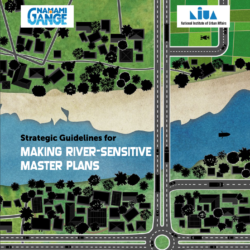River Sensitive Cities
Mar 2019 – Mar 2022
Phase 2: Centre for River Sensitive Cities
Dec 2021 – Dec 2024
Ongoing
Phase 1: URVERS
The broad intent of this project is to promulgate sustainable urban development that makes judicious use of vital natural riverine resources. The project seeks to demonstrate that maintaining healthy rivers in the Ganga River Basin is crucial to enhance liveability in urban areas of the basin.
Phase 2: Centre for River Sensitive Cities
The mission of the centre is to propel the agenda for river-sensitive urban development in India. The centre will continue to lead and expand the scope of the urban river planning and management narrative, with a view to target practical on-the ground transformative action in cities. The agenda for the centre is geared towards creating an enabling environment for and facilitating the implementation of practices, regulations and projects, that seek to harmonize the city-river relationship. y
Highlights / Unique Features
Phase 1: URVERS
Key outcomes of the phase 1 project are as follows:
Developing a strategic guidelines for mainstreaming river management in a city’s Master Plan.
Supporting one Class I town (Kanpur) to systematically prepare an Urban River Management Plan (URMP).
Rolling out capacity building modules for ULBs and other stakeholders on river health management.
Phase 2: Centre for River Sensitive Cities
Its focus is on three core agenda items:
Managing the River Cities Alliance (RCA) – An alliance of thirty river cities has been established. The RCA Secretariat at NIUA is providing support for managing the day-to-day activities and bolstering its efforts to achieve a state of self-governance.
Developing decision support systems for urban river management – The RCA Secretariat at NIUA is intended to develop a range of decision support systems for diverse aspects of urban river management.
Advocacy and capacity building – The RCA Secretariat at NIUA is intended to sensitize cities to the benefits of integrating river consideration in their development landscape. This includes training interested cities in the application of the various frameworks, toolkits and best practices, developed for urban river management. It also includes promoting river-related subject areas within the academic curriculum of different courses, with a view to influence next generation practitioners.



